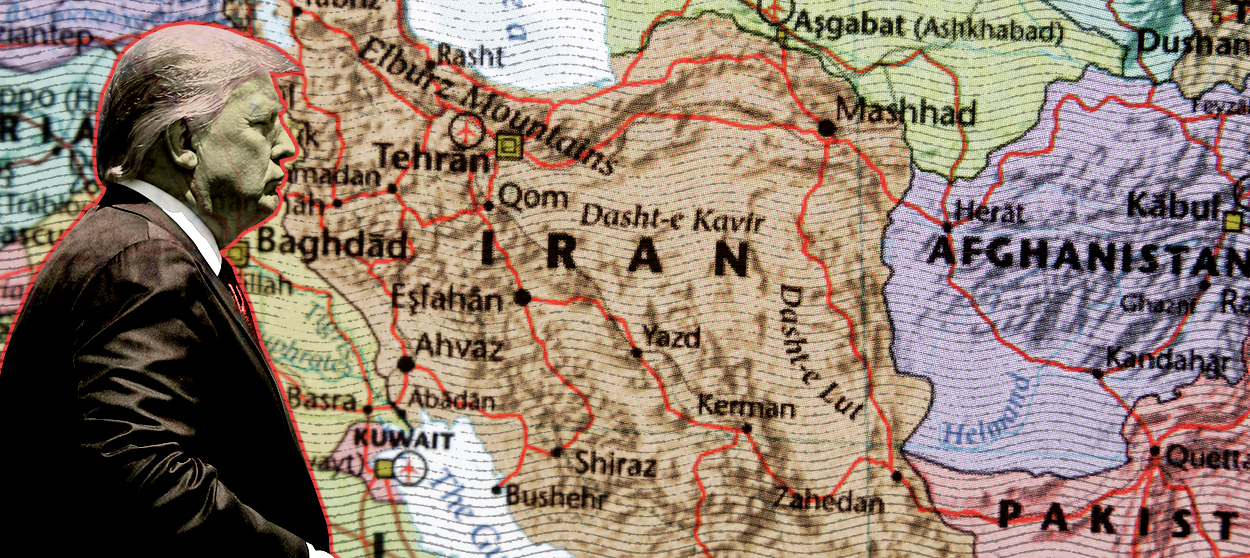War with Iran would be as illegal as it is idiotic
If the U.S. weren't so powerful it would be seen for what it is — a rogue state and a threat to international peace.


A free daily email with the biggest news stories of the day – and the best features from TheWeek.com
You are now subscribed
Your newsletter sign-up was successful
The Trump administration is seemingly gearing up for a war on Iran. First President Trump unilaterally reneged on the nuclear deal with that country — despite the fact that Iran was holding to its side of the bargain, and indeed has continued to do so despite the American betrayal. Now the Trump regime is ratcheting up tensions some more, in what is pretty clearly a ham-fisted attempt to gin up casus belli for invasion.
The New York Times reports that administration officials, led by national security adviser and slavering warmonger John Bolton — have drawn up plans to deploy a force of 120,000 troops "should Iran attack American forces or accelerate work on nuclear weapons[.]" That comes on the heels of the U.S. sending a carrier strike group and long-range bombers to the area in early May, and the administration blaming recent minor attacks on Saudi tankers and other oil infrastructure on Iran without any evidence. One anonymous official confirmed to the Times that the "ultimate goal of the yearlong economic sanctions campaign ... was to draw Iran into an armed conflict with the U.S."
War with Iran is a monstrous and illegal idea, which could very well turn out disastrously for the U.S. itself. Trump cannot be allowed to start another war of aggression.
The Week
Escape your echo chamber. Get the facts behind the news, plus analysis from multiple perspectives.

Sign up for The Week's Free Newsletters
From our morning news briefing to a weekly Good News Newsletter, get the best of The Week delivered directly to your inbox.
From our morning news briefing to a weekly Good News Newsletter, get the best of The Week delivered directly to your inbox.
The important context here is that France, the U.K., Germany, China, and the European Union itself are still party to the nuclear deal with Iran. Since Trump's abrogation of the deal and re-imposition of sanctions was utterly unjustified, Iran wants the remaining partners to hold up their end of the deal and find a way around U.S. sanctions. If they don't, the Iranian government is threatening (with perfect justice) to break the deal and start holding on to its enriched uranium.
How might this work? As Henry Farrell and Abraham Newman write, the major vector of sanctions against Iran happen through the Society for Worldwide Interbank Financial Telecommunications (SWIFT), a Belgian cooperative that facilitates most international bank transactions. SWIFT is located in Europe, but because most such transactions are denominated in dollars, the U.S. has enormous leverage over it. Cutting Iran out of the system, as happened in 2012, badly damaged the Iranian banking system and economy.
However, that round of sanctions happened with the agreement of Europe. By contrast, the E.U. legally forbade European countries from complying with Trump's new sanctions. The law had no teeth and SWIFT complied with Trump, but the E.U. has since developed a "Special Purpose Vehicle" which allows for transactions between Iran and Europe. So far it has only been used for humanitarian trade, but it could easily be used for normal trade as well. Indeed, it could well be the first step in Europe (perhaps along with China) developing an alternative financial infrastructure which would break U.S. control over international transactions. So all this belligerent aggression may well break the sanctions infrastructure Trump loves so much (though that would probably be a good thing at this point, to be fair).
More importantly, launching an unprovoked invasion of Iran would be illegal. Wars of aggression are categorically forbidden under the U.N. Charter, which was duly passed by the Senate and is thus constitutionally binding. There is not even any enabling legislation as there was with Iraq in 2002.
A free daily email with the biggest news stories of the day – and the best features from TheWeek.com
America also has zero significant international support. On the contrary, a top U.K. general said he saw no increased risk from Iran or its proxies, and Spain pulled its frigate out of the carrier strike group headed to Iran in protest. On balance, Iran is acting with remarkable restraint given blatant U.S. provocation, backstabbing, and bullying.
It's also worth noting, once again, that Iran has a far more formidable military than Saddam Hussein's rattletrap battalions in 2003. As former U.S. Army General John Abazaid has said, Iranian forces are the strongest in the Middle East outside of Israel. It also has more than twice the population and nearly four times the landmass of Iraq, with much more rugged terrain — allowing for more effective guerrilla tactics, as American forces have learned at great cost in Afghanistan.
Indeed, the Pentagon itself conducted war games simulating a conflict with Iran in 2002. The "Iranian" commander, General Paul K. Van Riper, noting American dominance of electronic communications, used motorcycle couriers to transmit messages and lights to land planes without radio. When U.S. naval forces arrived with a surrender ultimatum, Riper launched a surprise mass missile attack that sank a carrier and 15 other ships — causing 20,000 virtual casualties in minutes. Then he launched a swarm attack of small boats, and sank several more ships.
Naturally, the top brass responded by restarting the exercise and granting cheat codes to the "American" side so they could not lose. Riper quit in the middle of the exercise, and later commented that "it simply became a scripted exercise. They had a predetermined end, and they scripted the exercise to that end."
Now, Iran might well fold easily in the face of a U.S. assault. But their force structure closely resembles the Riper model, largely based around asymmetric combat. Their navy has few conventional ships, but swarms of small, heavily-armed fast attack boats, mines, mini-submarines, and disguised civilian ships. U.S. ships would no doubt be able to pick off many of them, but it would only take a few lucky torpedo hits to sink even the largest vessels.
The American military clearly has a bad case of imperial arrogance. Americans in general have become used to easily steamrolling conventional forces, and only suffering relatively few combat deaths even in counterinsurgency wars. But if Iran were to sink just the carrier flagship in the strike group, over 6,000 sailors and airmen could be killed. That's nearly a quarter more U.S. military personnel than have died in the entire Iraq War — and it could easily be far, far worse. Many times that number might die in a prolonged war and occupation — not to mention the untold thousands of innocent Iranians who would die for no reason at all. Only a blustering, bloodthirsty idiot like John Bolton could dismiss such a risk.
If the United States weren't so powerful it would be seen for what it is — a rogue state and a threat to international peace. But at least we Americans can try to stop a horrifying disaster before it starts.
Ryan Cooper is a national correspondent at TheWeek.com. His work has appeared in the Washington Monthly, The New Republic, and the Washington Post.
-
 The problem with diagnosing profound autism
The problem with diagnosing profound autismThe Explainer Experts are reconsidering the idea of autism as a spectrum, which could impact diagnoses and policy making for the condition
-
 What to know before filing your own taxes for the first time
What to know before filing your own taxes for the first timethe explainer Tackle this financial milestone with confidence
-
 The biggest box office flops of the 21st century
The biggest box office flops of the 21st centuryin depth Unnecessary remakes and turgid, expensive CGI-fests highlight this list of these most notorious box-office losers
-
 ‘The mark’s significance is psychological, if that’
‘The mark’s significance is psychological, if that’Instant Opinion Opinion, comment and editorials of the day
-
 ‘My donation felt like a rejection of the day’s politics’
‘My donation felt like a rejection of the day’s politics’Instant Opinion Opinion, comment and editorials of the day
-
 How Iran protest death tolls have been politicised
How Iran protest death tolls have been politicisedIn the Spotlight Regime blames killing of ‘several thousand’ people on foreign actors and uses videos of bodies as ‘psychological warfare’ to scare protesters
-
 ‘It may portend something more ominous’
‘It may portend something more ominous’Instant Opinion Opinion, comment and editorials of the day
-
 What are Donald Trump’s options in Iran?
What are Donald Trump’s options in Iran?Today's Big Question Military strikes? Regime overthrow? Cyberattacks? Sanctions? How can the US help Iranian protesters?
-
 Unrest in Iran: how the latest protests spread like wildfire
Unrest in Iran: how the latest protests spread like wildfireIn the Spotlight Deep-rooted discontent at the country’s ‘entire regime’ and economic concerns have sparked widespread protest far beyond Tehran
-
 The billionaires’ wealth tax: a catastrophe for California?
The billionaires’ wealth tax: a catastrophe for California?Talking Point Peter Thiel and Larry Page preparing to change state residency
-
 What is the Donroe Doctrine?
What is the Donroe Doctrine?The Explainer Donald Trump has taken a 19th century US foreign policy and turbocharged it
